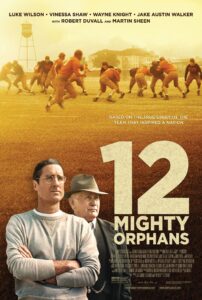12 Mighty Orphans
Posted on June 15, 2021 at 8:13 pm
B| Lowest Recommended Age: | Middle School |
| MPAA Rating: | Rated PG-13 for some suggestive references, brief teen drinking, smoking, language, and violence |
| Profanity: | Some strong and crude language |
| Alcohol/ Drugs: | Reference to alcoholic parent, alcoholic character, teen drinking |
| Violence/ Scariness: | WWI battle flashbacks and reference to sad deaths, brutal corporal punishment, beatings, injuries, some graphic images |
| Diversity Issues: | Class issues |
| Date Released to Theaters: | June 18, 2021 |

Director/co-screenwriter Ty Roberts follows his previous two Texas-based films, “This Side of the Dirt” and “The Iron Orchard” with “12 Mighty Orphans,” based on a fact-based novel by Jim Dent.
Teachers Rusty Russell (a subdued but solid Luke Wilson) and his wife Juanita (Vinessa Shaw) arrive at the Masonic Home and School for orphans. They are committed and admittedly optimistic about giving the residents hope, opportunity, and a sense of belonging. That includes setting up a football team, even though the boys are smaller than the other players in the league, have no practice field or equipment, and literally have never held a football before. As we learn in brief flashbacks over the course of the film, Rusty is suffering from PTSD due to his experiences in WWI, including the death of the brother he promised to protect.
At he Masonic Home, there is a kind-hearted doctor with an alcohol dependency (Martin Sheen) and a brutal, angry man named Frank (Wayne Knight), who sees the boys only as free labor for his print shop. Frank beats the boys for the slightest infraction and considers every moment away from the shop for school or football, as stealing from him. He, by the way, is stealing from them, skimming money from the shop.
Rusty and Doc start working with the boys. And the boys start winning games. When the other teams find they cannot beat them on the field, some of them start trying to beat them in other ways. Rusty has to make up for the smaller size of his players with a new strategy called the spread defense that would change the game of football at the most fundamental level.
Cinematographer David McFarland uses muted tones to evoke the era, a nod to the sepia images we associate with the era but also providing a context of dust, depression, and deprivation. Even though there are moments of intense emotion and struggle, Roberts maintains a quiet, deliberate tone that adds dignity to the storytelling, though it slows sections of the film, particularly when characters and incidents and issues start to pile up in a distracting manner. Sheen gives some wry sweetness to a thinly conceived role that balances Wilson’s subtle decency. The real triumph of the story is not in the goals scored but in the way that dedication, attention, and a good example can transform not just those who are inspired directly, but those who see in them possibilities not previously imagined.
Parents should know that this film includes some strong language, crude sexual references, alcohol abuse, scenes of combat, and injuries with some graphic images.
Family discussion: Why did Rusty think football was so important for the boys? How do we treat parentless children differently now?
If you like this, try: “Remember the Titans” and the book that inspired this film.
